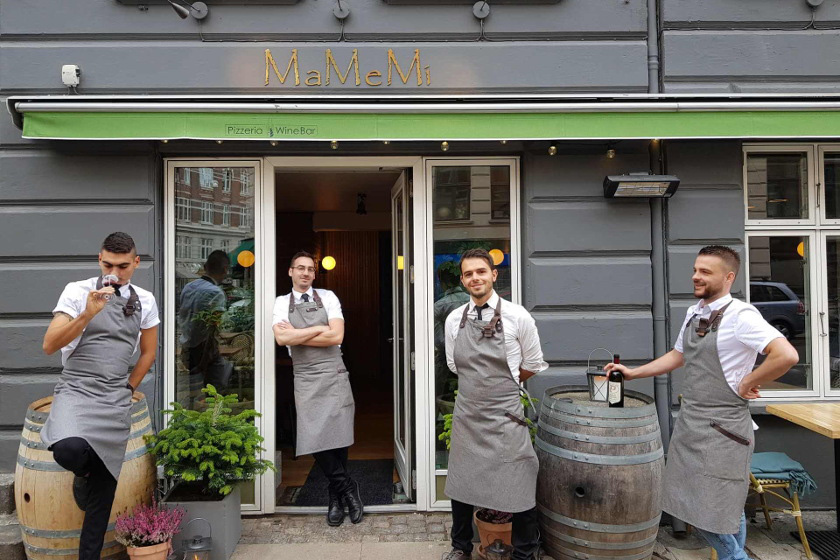The Great Pizza Divide: North vs South
Italy’s pizza story is really a tale of two traditions, each reflecting the character of their regions. Growing up near Rome, our founder Francesco witnessed this firsthand – how a simple combination of dough, tomatoes, and cheese could express the soul of different Italian cities.
The beauty lies in the diversity. While tourists might expect one “authentic” Italian pizza, locals know that asking for pizza in Naples versus Rome will give you completely different experiences – both authentically Italian, both absolutely delicious.
Neapolitan: The Crown Jewel from the South
Let’s start with the most famous style – pizza Napoletana. This is what most people picture when they think of Italian pizza, and for good reason. Born in Naples in the 18th century, this style has such cultural importance that UNESCO recognizes it as an Intangible Cultural Heritage.
You can also read: Roman vs. Neapolitan pizza
What Makes Neapolitan Special
Neapolitan pizza features a soft, pillowy crust with slightly charred edges called “leopard spots.” The dough is incredibly wet and requires skilled hands to stretch without tearing. Baked in wood-fired ovens at temperatures reaching 900°F (480°C), these pizzas cook in just 60-90 seconds. The result? A pizza with a soft, chewy center and those distinctive puffy, blistered edges. It’s meant to be eaten immediately with a fork and knife because the center can be quite wet from the fresh mozzarella and tomatoes.
Roman Style: Our Heart and Soul
This is where our passion lies. Roman-style pizza, or *pizza tonda*, represents a completely different philosophy from its southern cousin. Where Neapolitan celebrates soft and wet, Roman pizza is all about thin and crispy.
The Roman Approach at MaMeMi
Our Roman-style pizzas start with dough that’s fermented for 48 hours using our secret blend of five organic Italian flours. This creates a base that’s paper-thin yet sturdy enough to hold toppings without becoming soggy.
Unlike Neapolitan pizza, Roman pizza is rolled out thin – almost cracker-like in its crispiness. You can easily eat it with your hands, and it never becomes heavy or overwhelming. This style allows the toppings to shine while providing that satisfying crunch that Romans have perfected over centuries.
The beauty of Roman pizza lies in its versatility. Whether you’re enjoying it as a quick lunch near Enghave Plads or pairing it with natural wine for an evening at our Vesterbro location, it adapts to any occasion.
Sicilian: The Square Revolution
Travel south to Sicily, and you’ll discover *sfincione* – a thick, square pizza that’s more like focaccia’s pizza-loving cousin. This style features a spongy, bread-like base topped with tomatoes, onions, anchovies, and a hard cheese like caciocavallo.
Sicilian pizza is baked in rectangular pans, creating those distinctive square slices. The crust is thick and airy, designed to soak up the robust flavors of the Mediterranean ingredients piled on top.
Al Taglio: Rome’s Street Food Genius
Here’s a Roman innovation that’s spreading worldwide – pizza al taglio, or “by the cut.” This rectangular pizza is baked in large sheets and sold by weight, cut with scissors to your desired portion.
The genius of al taglio is its practicality. Romans grab a piece for breakfast, lunch, or a quick snack. The dough is similar to our round Roman pizzas but adapted for sheet pan baking, creating a slightly thicker but still crispy base that can support more generous toppings.
Pizza in Teglia: The Pan-Baked Wonder
Another Roman variation is pizza in teglia – baked in well-oiled pans that create a slightly thicker, more focaccia-like base. The oil creates a golden, crispy bottom while keeping the interior soft and airy. This style bridges the gap between thin Roman pizza and thicker Sicilian varieties, offering the best of both worlds – crispy edges with a tender center.
Regional Specialties: Beyond the Famous Four
Ligurian Focaccia col Formaggio
From the coastal region of Liguria comes this cheese-stuffed flatbread that’s technically not pizza but shares the same wood-fired oven tradition. Paper-thin layers of dough sandwich creamy stracchino cheese, creating something that’s part pizza, part pastry, all delicious.
Pizza Fritta: Naples’ Fried Alternative
During World War II, when wood was scarce, Neapolitans created pizza fritta – fried pizza pockets filled with ricotta, mozzarella, and tomatoes. These golden pillows prove Italian ingenuity in adapting traditions to circumstances.
Pinsa Romana: The Ancient Revival
Recently revived in Rome, pinsa uses a blend of wheat, rice, and soy flours, creating an incredibly light, digestible base. The oval shape and unique flour blend make it distinctly different from traditional pizza dough.
Why We Chose Roman Style for Copenhagen
When we decided to bring authentic Italian pizza to Vesterbro, we chose Roman style for several reasons. The crispy base pairs beautifully with wine – something essential for our natural wine bar concept. The lighter, more digestible nature suits Copenhagen’s dining culture, where people appreciate quality over quantity.
Roman pizza also allows us to showcase premium ingredients without overwhelming them. Whether it’s our signature guanciale combinations or seasonal truffle creations, the crispy base provides the perfect foundation.
Pairing Styles with Wine
Each pizza style calls for different wine pairings. Neapolitan’s soft, wet center pairs beautifully with light, crisp whites that cut through the richness. Our Roman-style pizzas work wonderfully with both whites and reds from our collection of over 400 Italian wines.
The thin, crispy base doesn’t compete with wine flavors, making it perfect for exploring the nuanced tastes of organic and biodynamic Italian wines that our sommelier Danilo has carefully selected.
Modern Evolution: Respecting Tradition While Moving Forward
Today’s Italian pizzaiolos continue evolving these traditional styles. We see longer fermentation times, ancient grain flours, and creative toppings that respect traditional techniques while embracing modern tastes.
At MaMeMi, we honor Roman traditions while adapting to Copenhagen’s diverse dietary needs. Our vegan and gluten-free options maintain the essential characteristics of Roman-style pizza while accommodating different lifestyles.
The Style That Suits Your Mood
Understanding different Italian pizza styles helps you choose what suits your appetite and occasion. Want something quick and crispy while exploring Vesterbro? Roman style is perfect. Craving a more substantial, sit-down meal? You might prefer something closer to Neapolitan traditions.
The beauty of Italian pizza culture is that there’s no wrong choice – just different expressions of the same fundamental love for quality ingredients, skilled craftsmanship, and the joy of sharing good food.
Experience Roman Style in Copenhagen
Whether you’re a pizza purist or someone just discovering the diversity of Italian pizza styles, we invite you to experience what makes Roman-style pizza so special. Visit us on Vesterbro, just minutes from Vega, and taste the difference that comes from honoring centuries-old Roman techniques.
Each pizza we serve represents not just a meal, but a connection to the bustling pizzerias of Rome, the skilled hands of Italian pizzaiolos, and the timeless pleasure of perfectly balanced flavors. Discover the Roman difference at MaMeMi Pizzeria on Vesterbro. Book your table to experience authentic Italian pizza styles prepared with passion and respect for tradition.























